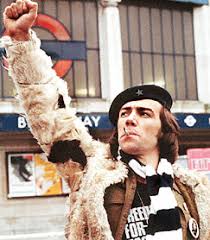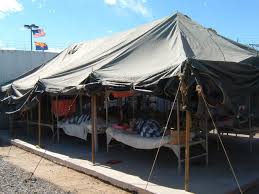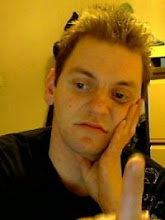 WATCH DOCUMENTARY HERE.
WATCH DOCUMENTARY HERE.There's something not quite right with the way Westminster interacts with Joe Schmuck like me and you. We aren't quite at George Orwells 1984 yet, but there is a palpable feeling that there is a rift between the public at large and the ruling classes. Almost every day we hear "out of touch." "in it for the take." and "don't live in the real world." aimed at the Whitehall mafia. The nadir was probably last year after the expenses scandal broke. It just seemed to cement to so many that politicians were a world apart from real people. I'd also add that I think that our system of the 3 main parties prioritising scrambling for the marginal seats doesn't help, but that's another story. Voter turnouts are very low on almost every type of elections going, and I feel that people are not utilising perhaps their powers of suffrage, and are falling into apathy (or more worryingly that perhaps less savoury politics might fill the vacuum left.) It seems that former top Tory Michael Portillo agrees, and wants to what has eluded our currant crop of chiefs, to do something about getting people back into politics.
The documentary covers the pros and cons of transferring power away from central Westminster back out to the towns and parishes of the country. He gives an account of how prior to WW2, the town hall had quite a whack, a whack that was lost forever by the centralised semi-command economy a war and the peace time rebuilding needed. Then the Thatchers governments attempts to nip "loony left" councils in the bud by reducing thier spending rates, and then the poll tax (community charge, of which Portillo admits his role in creating) which ostensibly set out to make high spending councils pay more, but was so skewed against many people and unpopular it cost Thatcher her throne. To the current target obsessed central government of today (apparently sent a toilet budget projection to Watford. No really!) Not exactly the direction I'd take.
As I said we see various examples of people power in practice. The democratically elected mayor of Hartlipool, who got the position he signed up for, for a laugh; dressing up as monkey at football matches, but ended up taking to the job seriously, and becoming a pretty good mayor, being elected several times. The film shows how he is known by name to the people of the town, and is popular for being able to tackle local issues and not seen as an insider of the "political class.". Portillo sees how a local shop in Dorset was saved from closure (nearest shop 13 miles away.) by locals stepping in to volunteer (it has had to expand its services.) their time, and how a group of parents were lobbying their MP's in London to provide a new secondry school to keep their close knit kids together. They had actively participated, even eyeing up an old hospital building, and learning about political process of who to contact and what to do to get their school. It was positive to see them actively meeting half way with their local government, implementing an idea to use collective people power to hopefully get their school. The last example was again in London where voters met up in a community hall to see what local council spending should be allocated, using "Who wants to be a millionaire" keypads. They could vote on what they wanted their taxes spent on (CCTV, minibuses for old people.) after debating with each other. It was like a raffle atmosphere, with countdowns, and charts of who got what. It'd be interesting to see how opening up what got spent and how, results in perhaps more representative spending. Sometimes it wasn't to clear in the programme how effective these things were.

As I said the documentary made clear that People power could become populism by any other name, and two controversial examples of this in practice are the Mayor of Doncaster. Peter Davies (pictured), and Joe Arpaio; the so called "Americas Toughest Sheriff" (you'll probably have heard about the prison camp in the desert he set up where the inmates have to wear pink boxers.). Davies, the English Democrat elected mayor of Doncaster is the bluff talking Yorkshireman archetype, a staunch and vocal plain talking right winger on most issues (e.g PC, out of EU, pro capital punishment.) He is known for his attempts to trim council spending by cuts including his own salary, stopping gay pride funding, and getting rid of PC "non jobs" (though I suppose ironically he would have to spend money in order to create a bureaucracy that deed what was a "non - job".) He has also, even more controversially attempted to cut spending for translation services to new immigrants and established non - English speakers in order to get them to improve English (I can't help think this is like banning Weightwatchers to cut obesity. Are they supposed to read an Oxford dictionary really quickly?) The film does point out (as does a local women) that he doesn't have the mandate as mayor to pull off a lot of what he wants, and that some of it may just be saloon bar politics. Joe Arpaio elected Sheriff of Maricopa County, Arizona is an even more controversial example of what people power could bring if police chiefs were democratically elected. He is still popular (but popularity falling) for his ultra hard line policies, but we hear that he is controversial for his treatment of illegal immigrants and from Hispanics who claim he singles them out in particular. One man claims to have been badly beaten by his men for a trivial crime. This is one area I'd be wary of a democratic head. Law enforcement is both emotive and a complex body. We hear from a British chief constable that it could result in complex murder and terrorist monitoring resources being shifted away to popular but limited crime prevention methods like high profile beat based policing. I also think it runs the risk of a police chief under pressure to conclude a high profile case, to get results to satiate public opinion. It would have helped to see how affective Arpaios methods were in recidivism and crime reduction, but we didn't so we have little to go on in that regard, a running problem with the documentary.

All in all the documentary (even though it was edited a little to much to give a really big picture.) confirmed my belief that decentralising powers away from Westminster and giving local powers back to local government is a step in the right direction. There is a lot of bean counting goes on in local councils, and my own town of Bolton has suffered from this. Our thriving Market Hall and its independent small shops were revamped as a small shopping mall in a greatly unpopular move that was supposed to put Bolton more in line with Manchester. I think it was a bad decision that has harmed the town. Why would someone pay good money to park in Bolton, when they could go to a mall with free parking that's 20 times bigger in Trafford? I can't help think that an elected mayor, and a more active council with the ear of public opinion could have stopped this from happening. As for whether we would end up with loads of Peter Davies style mayors? The program showed that people when given the opportunity to influence things this way, that they can be quite focused about it, and can learn political process (sadly lacking in the greater public.). Doncaster also happened after the huge corruption that council has had and the expenses so Davies could capitalise on increased populist sentiment (again the documentary is reticent on how popular he actually is.) during unusual circumstances, rather than what would be the norm. He is also limited in the greater social context of his more dodgy ideas, so the pitfalls of this are reduced. But it seems give the public a stick up to local policies, and they seem to take it willingly. Power to the people then.
Postscript. Peter Davies has really been quite low profile as Mayor, he hasn't been as controversial as I thought. I'd imagine he's having trouble putting his money where his mouth is, on the some of his saloon bar talk. This hunch is highlighted by this brilliant interview he has with Toby Foster (aka that guy of Les Alamos on "Phoenix Nights" which shows how depressingly low rent he is. Perhaps showing him up like this will let people be turned away from simple populist tub thumping. Heres Hoping!

No comments:
Post a Comment